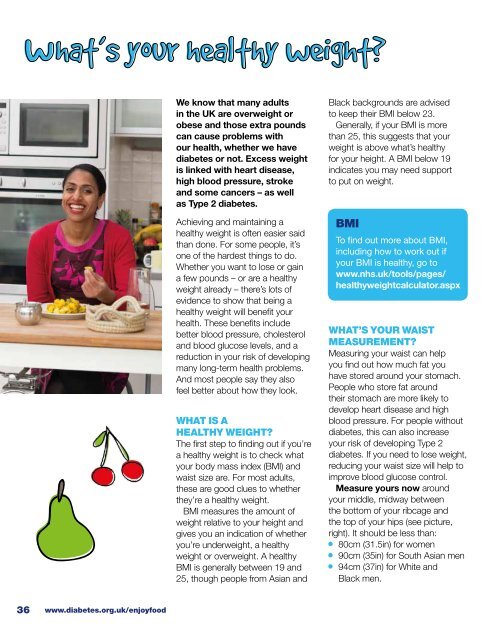Enjoy food
9f7d301hoGi
9f7d301hoGi
You also want an ePaper? Increase the reach of your titles
YUMPU automatically turns print PDFs into web optimized ePapers that Google loves.
what’s your healthy weight?<br />
We know that many adults<br />
in the UK are overweight or<br />
obese and those extra pounds<br />
can cause problems with<br />
our health, whether we have<br />
diabetes or not. Excess weight<br />
is linked with heart disease,<br />
high blood pressure, stroke<br />
and some cancers – as well<br />
as Type 2 diabetes.<br />
Achieving and maintaining a<br />
healthy weight is often easier said<br />
than done. For some people, it’s<br />
one of the hardest things to do.<br />
Whether you want to lose or gain<br />
a few pounds – or are a healthy<br />
weight already – there’s lots of<br />
evidence to show that being a<br />
healthy weight will benefit your<br />
health. These benefits include<br />
better blood pressure, cholesterol<br />
and blood glucose levels, and a<br />
reduction in your risk of developing<br />
many long-term health problems.<br />
And most people say they also<br />
feel better about how they look.<br />
WHAT IS A<br />
HEALTHY WEIGHT?<br />
The first step to finding out if you’re<br />
a healthy weight is to check what<br />
your body mass index (BMI) and<br />
waist size are. For most adults,<br />
these are good clues to whether<br />
they’re a healthy weight.<br />
BMI measures the amount of<br />
weight relative to your height and<br />
gives you an indication of whether<br />
you’re underweight, a healthy<br />
weight or overweight. A healthy<br />
BMI is generally between 19 and<br />
25, though people from Asian and<br />
Black backgrounds are advised<br />
to keep their BMI below 23.<br />
Generally, if your BMI is more<br />
than 25, this suggests that your<br />
weight is above what’s healthy<br />
for your height. A BMI below 19<br />
indicates you may need support<br />
to put on weight.<br />
BMI<br />
To find out more about BMI,<br />
including how to work out if<br />
your BMI is healthy, go to<br />
www.nhs.uk/tools/pages/<br />
healthyweightcalculator.aspx<br />
WHAT’S YOUR WAIST<br />
MEASUREMENT?<br />
Measuring your waist can help<br />
you find out how much fat you<br />
have stored around your stomach.<br />
People who store fat around<br />
their stomach are more likely to<br />
develop heart disease and high<br />
blood pressure. For people without<br />
diabetes, this can also increase<br />
your risk of developing Type 2<br />
diabetes. If you need to lose weight,<br />
reducing your waist size will help to<br />
improve blood glucose control.<br />
Measure yours now around<br />
your middle, midway between<br />
the bottom of your ribcage and<br />
the top of your hips (see picture,<br />
right). It should be less than:<br />
• 80cm (31.5in) for women<br />
• 90cm (35in) for South Asian men<br />
• 94cm (37in) for White and<br />
Black men.<br />
36<br />
www.diabetes.org.uk/enjoy<strong>food</strong>


